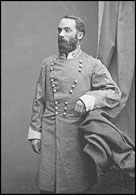Colonial Wars |
American Wars |
Link To This Page — Contact Us —
Lieutenant General
Joseph "Fightin' Joe" Wheeler
 |
| NAME |
| Wheeler, Joseph |
| BORN |
| September 10, 1836 Augusta, Georgia |
| DIED |
| January 25, 1906 Brooklyn, New York |
| ARMY |
| Confederate |
Wheeler resigned his U.S. Army commission, and reaching Augusta in March, he was appointed 1st lieutenant, corps of artillery. He was stationed at Pensacola, and in September was promoted to Colonel of the 19th Alabama Infantry Regiment. He was promoted to Brigadier General and given command of the cavalry of the Army of Mississippi in July of 1862. Given command of a corps of mounted troopers, he led it in the Tullahoma Campaign and at Chickamauga was in charge of one of the 2 cavalry corps. At the battle of Shiloh, he led his brigade in the vigorous attack which resulted in the capture of Gen. Prentiss and over 2,000 men.
In the cavalry service, he won promotion to the rank of major-general and corps command early in 1863. At the age of 27 years, he was the senior cavalry general of the Confederate Army. His many cavalry raids captured thousands of Union prisoners and supplies, and destroyed an enourmous amount of equipment. From early in 1862 until the war closed, he was almost constantly engaged in battle. He was wounded 3 times. "Wheeler's cavalry" became household words, and "Little Joe" Wheeler, as his men affectionately called him, was the pride of the Central South.
Wheeler was put in charge of all the mounted troops with the Army of Tennessee. He led his men in the Atlanta and the Carolinas campaigns. During these last 2 campaigns, he was noted for his raids on the Union supply lines. He became second only to Lieutenant Gen. Nathan B. Forrest as the top Confederate raider. Following the fall of Atlanta, Wheeler's corps was left behind to deal with Sherman while Hood launched his invasion of middle Tennessee. Wheeler proved unsuccessful in hindering Sherman's "March to the Sea."
He fought his last fight April 15th. and the 29th, He was captured near Atlanta after Gen. Joseph E. Johnston's surrender, and issued his farewell address to the cavalry, summarizing their career and his own in the eloquent words: "You are the sole victors of more than two hundred severely contested fields; you have participated in more than a thousand conflicts of arms; you are heroes, veterans, patriots; the bones of your comrades mark the battlefields upon the soil of Kentucky, Tennessee, Virginia, North Carolina, South Carolina, Georgia, Alabama and Mississippi; you have done all that human exertion could accomplish."
He was imprisoned at Fort Delaware until June 8th. A longtime congressman from Alabama in the postwar years, he donned the blue as a major general of volunteers in the war with Spain.
After the war, Wheeler was in the commission business at New Orleans. He became a cotton planter in Wheeler, Alabama (which was named after him). He entered politics, and was elected to the U.S. House of Representatives from 1885-1900. President William McKinley appointed him a major general of volunteers during the Spanish-American War, and action which was praised as a sign of the healing of relations between the Union and the former Confederacy.
After leading troops in the war, Wheeler was commissioned a Brigadier General in the Regular Army as of September 10, 1900, and retired on his 64th birthday. In 1900, he was retired with the regular army rank of Brigadier General. His Confederate career had earned him the sobriquet "Fightin' Joe."
He was one of only a handful of Confederates to be buried in Arlington National Cemetery.
Promotions:
- 1st Lieutenant- March ??, 1861
- Colonel - September 4, 1861
- Brigadier General - October 30, 1862
- Major General - January 20, 1863
- Lieutenant General - February 28, 1865
Major Commands:
- Cavalry Division, Army of Tennessee (December 1862-March 16, 1863)
- Cavalry corps, Army of Tennessee (March 16, 1863-fall 1864)
- Cavalry Corps, Department of South Carolina, Georgia and Florida (fall 1864-March 1865)
- Corps, Hampton's Cavalry Command, Army of Tennessee (March-April 26, 1865)
